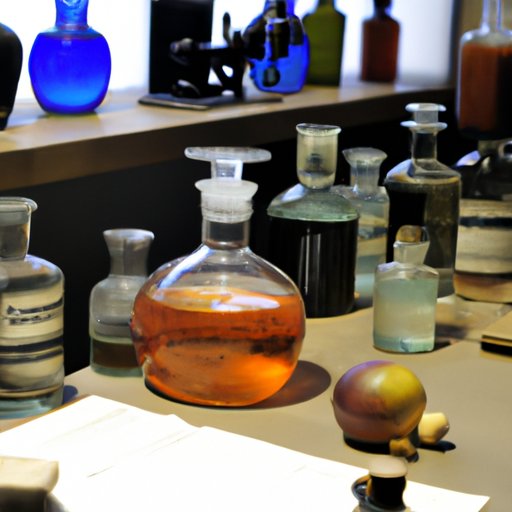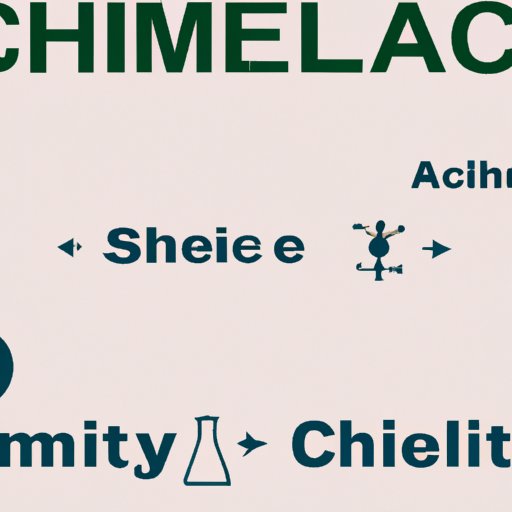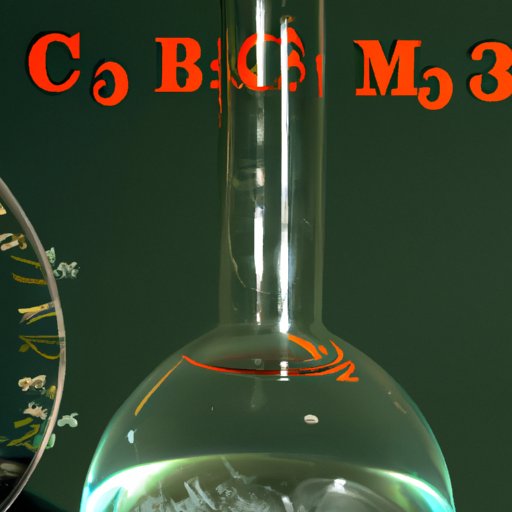Introduction
Chemistry and alchemy have often been confused for one another. While both are related to the study of matter, there are some key differences that set them apart. This article will explore why chemistry is considered a science, while alchemy has not been accepted as such.
Defining Chemistry and Alchemy
Chemistry is defined by the American Chemical Society as “the study of the composition, structure, properties, and reactions of matter, especially of atomic and molecular systems.” In contrast, alchemy is an ancient practice focused on the transformation of matter, typically with the goal of turning base metals into gold or silver. Alchemists also sought to find a cure for all diseases and the elixir of life, although these pursuits were never successful.

Historical Development of Chemistry from Alchemy
The history of chemistry can be traced back to alchemy. Over time, certain discoveries and advancements led to the development of modern chemistry. One key discovery was the law of conservation of mass, which states that in any chemical reaction, mass is neither created nor destroyed. This discovery helped to debunk some of the claims made by alchemists, who believed that it was possible to turn base metals into gold. Other important discoveries included the law of multiple proportions, which states that when elements combine to form compounds, they do so in fixed ratios, and the law of definite proportions, which states that a particular compound always contains the same elements combined in the same proportion by mass.
Scientific Principles Behind Chemistry
One of the major reasons why chemistry is considered a science is because it is based on scientific principles. These include the laws of thermodynamics, which describe the relationship between energy and work, as well as the laws of motion, which explain how objects move and interact with one another. These principles provide a basis for understanding how chemical reactions occur, and allow chemists to make predictions about what will happen in a given situation.
In contrast, alchemy was not based on scientific principles. Instead, it relied heavily on superstition and mysticism. This lack of scientific basis is one of the main reasons why alchemy was not accepted as a legitimate science.
Experiments Conducted in Chemistry
Another way in which chemistry differs from alchemy is the type of experiments that are conducted. In chemistry, experiments are designed to test specific hypotheses and draw conclusions from the data that is collected. Experiments are carefully planned and controlled, and data is collected and analyzed in order to draw meaningful conclusions.
In contrast, alchemical experiments were often unstructured and lacked control. Alchemists tended to rely more on guesswork and intuition than on careful experimentation. As a result, their experiments rarely yielded reliable results.
Role of Mathematics and Theory in Chemistry
Mathematics and theory play a crucial role in chemistry. Mathematical equations can be used to predict the behavior of atoms and molecules, and theoretical models can be used to explain complex chemical phenomena. By utilizing mathematics and theory, chemists are able to gain a deeper understanding of chemical processes and develop effective strategies for synthesis and analysis.
Alchemy, on the other hand, had no use for mathematics or theory. Alchemists relied on superstition and mysticism rather than rigorous scientific reasoning. As a result, alchemy was unable to make any real progress in understanding the nature of matter.

Attitude of Scientific Community Towards Chemistry and Alchemy
The attitude of the scientific community towards chemistry and alchemy has also played a role in determining why only one is accepted as a legitimate science. The scientific community has long recognized the importance of chemistry and has invested resources into furthering its understanding. In contrast, alchemy has been largely dismissed as pseudoscience.
This attitude is reflected in the fact that most universities offer courses in chemistry, but not in alchemy. Furthermore, journals such as Nature, Science, and Proceedings of the National Academy of Sciences publish papers on chemistry, but have no interest in publishing papers on alchemy.
Conclusion
In summary, chemistry is accepted as a science due to its reliance on scientific principles, mathematical equations, and theoretical models. Experiments are carefully planned and controlled, and the results are analyzed objectively. In contrast, alchemy relies heavily on superstition and mysticism, and experiments lack structure and control. Furthermore, the scientific community has long recognized the importance of chemistry, while alchemy has been largely dismissed as pseudoscience.
It is clear that there are some key differences between chemistry and alchemy that explain why only one of them is accepted as a legitimate science. Chemistry is based on scientific principles, mathematics, and theory, while alchemy is not. Chemistry experiments are carefully planned and controlled, while alchemy experiments lack structure and control. Finally, the scientific community has long recognized the importance of chemistry, while alchemy has been largely dismissed as pseudoscience.
(Note: Is this article not meeting your expectations? Do you have knowledge or insights to share? Unlock new opportunities and expand your reach by joining our authors team. Click Registration to join us and share your expertise with our readers.)
